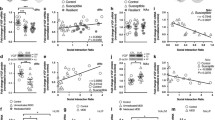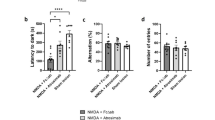Abstract
Rationale
Tumor necrosis factor-α (TNFα) acts within the brain to induce sickness behavior, but the molecular mechanisms are still unknown. TNFα binding induces receptor trimerization, activation of c-Jun N-terminal kinase (JNK), and induction of downstream transcription factors.
Objectives
We hypothesized that TNFα-induced sickness behavior can be blocked by a novel JNK inhibitor.
Methods
To test this idea, we used a bipartite protein consisting of a ten-amino-acid sequence of the trans-activating domain of the viral TAT protein (D-TAT) linked to a 19-amino-acid peptide that specifically inhibits JNK activation (D-JNKI-1). C57BL/6J mice were pre-treated intracerebroventricularly (i.c.v.) with D-JNKI-1 or the control peptide containing only the protein transduction domain, D-TAT. Mice were then injected centrally with an optimal amount of TNFα (50 ng/mouse) to induce sickness behavior. Sickness was assessed as a decrease in social exploration of a novel juvenile, an increase in duration of immobility and loss of body weight.
Results
Pre-treatment with D-JNKI-1 (10 ng/mouse), but not D-TAT, significantly inhibited all three indices of sickness induced by central TNFα.
Conclusions
These findings demonstrate that D-JNKI-1 can abrogate TNFα-induced sickness behavior and suggest a potential therapeutic target for treating major depressive disorders that develop on a background of cytokine-induced sickness behavior.


Similar content being viewed by others
References
Becker-Hapak M, McAllister SS, Dowdy SF (2001) TAT-mediated protein transduction into mammalian cells. Methods 24:247–256
Bette M, Kaut O, Schafer MK, Weihe E (2003) Constitutive expression of p55TNFR mRNA and mitogen-specific up-regulation of TNF alpha and p75TNFR mRNA in mouse brain. J Comp Neurol 465:417–430
Bluthe RM, Dantzer R, Kelley KW (1991) Interleukin-1 mediates behavioural but not metabolic effects of tumor necrosis factor alpha in mice. Eur J Pharmacol 209:281–283
Bluthe RM, Pawlowski M, Suarez S, Parnet P, Pittman Q, Kelley KW, Dantzer R (1994) Synergy between tumor necrosis factor alpha and interleukin-1 in the induction of sickness behavior in mice. Psychoneuroendocrinology 19:197–207
Bluthe RM, Laye S, Michaud B, Combe C, Dantzer R, Parnet P (2000) Role of interleukin-1beta and tumour necrosis factor-alpha in lipopolysaccharide-induced sickness behaviour: a study with interleukin-1 type I receptor-deficient mice. Eur J Neurosci 12:4447–4456
Bluthe RM, Kelley KW, Dantzer R (2006) Effects of insulin-like growth factor-I on cytokine-induced sickness behavior in mice. Brain Behav Immun 20:57–63
Borsello T, Clarke PG, Hirt L, Vercelli A, Repici M, Schorderet DF, Bogousslavsky J, Bonny C (2003) A peptide inhibitor of c-Jun N-terminal kinase protects against excitotoxicity and cerebral ischemia. Nat Med 9:1180–1186
Bubici C, Papa S, Pham CG, Zazzeroni F, Franzoso G (2004) NF-kappaB and JNK: an intricate affair. Cell Cycle 3:1524–1529
Chauhan A, Tikoo A, Kapur AK, Singh M (2007) The taming of the cell penetrating domain of the HIV Tat: myths and realities. J Control Release 117:148–162
Crestani F, Seguy F, Dantzer R (1991) Behavioural effects of peripherally injected interleukin-1: role of prostaglandins. Brain Res 542:330–335
Dantzer R, Kelley KW (2007) Twenty years of research on cytokine-induced sickness behavior. Brain Behav Immun 21:153–160
Dantzer R, Bluthe RM, Castanon N, Kelley KW, Konsman JP, Laye S, Lestage J, Parnet P (2006) Cytokines, sickness behavior and depression. In: Ader R (ed) Psychoneuroimmunology, Fourth Edition. Academic Press, New York, NY, pp 281–318
Dantzer R, O’Connor JC, Freund GG, Johnson RW, Kelley KW (2008a) From inflammation to sickness and depression: when the immune system subjugates the brain. Nat Rev Neurosci 9:46–56
Dantzer R, Capuron L, Irwin MR, Miller AH, Ollat H, Hugh Perry V, Rousey S, Yirmiya R (2008b) Identification and treatment of symptoms associated with inflammation in medically ill patients. Psychoneuroendocrinology 33:18–29
Figiel I, Dzwonek K (2007) TNFalpha and TNF receptor 1 expression in the mixed neuronal-glial cultures of hippocampal dentate gyrus exposed to glutamate or trimethyltin. Brain Res 1131:17–28
Fiore M, Probert L, Kollias G, Akassoglou K, Alleva E, Aloe L (1996) Neurobehavioral alterations in developing transgenic mice expressing TNF-alpha in the brain. Brain Behav Immun 10:126–138
Fiore M, Alleva E, Probert L, Kollias G, Angelucci F, Aloe L (1998) Exploratory and displacement behavior in transgenic mice expressing high levels of brain TNF-alpha. Physiol Behav 63:571–576
Gustafsson AB, Gottlieb RA, Granville DJ (2005) TAT-mediated protein transduction: delivering biologically active proteins to the heart. Methods Mol Med 112:81–90
Kuan CY, Burke RE (2005) Targeting the JNK signaling pathway for stroke and Parkinson’s diseases therapy. Curr Drug Targets CNS Neurol Disord 4:63–67
Lanquillon S, Krieg JC, Bening-Abu-Shach U, Vedder H (2000) Cytokine production and treatment response in major depressive disorder. Neuropsychopharmacology 22:370–379
Lotocki G, de Rivero Vaccari JP, Perez ER, Alonso OF, Curbelo K, Keane RW, Dietrich WD (2006) Therapeutic hypothermia modulates TNFR1 signaling in the traumatized brain via early transient activation of the JNK pathway and suppression of XIAP cleavage. Eur J Neurosci 24:2283–2290
MacEwan DJ (2002) TNF ligands and receptors—a matter of life and death. Br J Pharmacol 135:855–875
Manning AM, Davis RJ (2003) Targeting JNK for therapeutic benefit: from junk to gold? Nat Rev Drug Discov 2:554–565
McCusker RH, Strle K, Broussard SR, Dantzer R, Bluthé RM, Kelley KW (2006) Crosstalk between insulin-like growth factors and pro-inflammatory cytokines. In: Adler R, Dantzer R, Glaser R, Heijnen C, Irwin M, Padgett D, Sheridan J (eds) Psychoneuroimmunology. Academic Press, New York, pp 171–191
Medeiros R, Prediger RD, Passos GF, Pandolfo P, Duarte FS, Franco JL, Dafre AL, Di Giunta G, Figueiredo CP, Takahashi RN, Campos MM, Calixto JB (2007) Connecting TNF-alpha signaling pathways to iNOS expression in a mouse model of Alzheimer’s disease: relevance for the behavioral and synaptic deficits induced by amyloid beta protein. J Neurosci 27:5394–5404
Minogue AM, Schmid AW, Fogarty MP, Moore AC, Campbell VA, Herron CE, Lynch MA (2003) Activation of the c-Jun N-terminal kinase signaling cascade mediates the effect of amyloid-beta on long term potentiation and cell death in hippocampus: a role for interleukin-1beta? J Biol Chem 278:27971–27980
Moraes JC, Amaral ME, Picardi PK, Calegari VC, Romanatto T, Bermudez-Echeverry M, Chiavegatto S, Saad MJ, Velloso LA (2006) Inducible-NOS but not neuronal-NOS participate in the acute effect of TNF-alpha on hypothalamic insulin-dependent inhibition of food intake. FEBS Lett 580:4625–4631
Nadjar A, Bluthe RM, May MJ, Dantzer R, Parnet P (2005) Inactivation of the cerebral NFkappaB pathway inhibits interleukin-1beta-induced sickness behavior and c-Fos expression in various brain nuclei. Neuropsychopharmacology 30:1492–1499
O’Connor JC, Lawson MA, André C, Moreau M, Lestage J, Cantanon N, Kelley KW, Dantzer R (2008a) Lipopolysaccharide-induced depressive-like behavior is mediated by indoleamine 2,3-dioxygenase activation in mice. Mol. Psychiat (in press) Jan 15 DOI 10.1038/sj.mp.4002148
O’Connor JC, McCusker RH, Strle K, Johnson RW, Dantzer R, Kelley KW (2008b) Regulation of IGF-I function by proinflammatory cytokines: At the interface of immunology and endocrinology. Cell. Immunol (in press)
Palin K, Bluthe RM, McCusker RH, Moos F, Dantzer R, Kelley KW (2007) TNFalpha-induced sickness behavior in mice with functional 55 kD TNF receptors is blocked by central IGF-I. J Neuroimmunol 187:55–60
Paxinos G, Franklin KBJ (2001) The mouse brain in stereotaxic coordinates, second edition (Deluxe) edn. Academic Press, New York, NY
Pradillo JM, Romera C, Hurtado O, Cardenas A, Moro MA, Leza JC, Davalos A, Castillo J, Lorenzo P, Lizasoain I (2005) TNFR1 upregulation mediates tolerance after brain ischemic preconditioning. J Cereb Blood Flow Metab 25:193–203
Repici M, Borsello T (2006) JNK pathway as therapeutic target to prevent degeneration in the central nervous system. Adv Exp Med Biol 588:145–155
Repici M, Centeno C, Tomasi S, Forloni G, Bonny C, Vercelli A, Borsello T (2007) Time-course of c-Jun N-terminal kinase activation after cerebral ischemia and effect of D-JNKI1 on c-Jun and caspase-3 activation. Neuroscience 150:40–49
Strle K, Broussard SR, McCusker RH, Shen WH, LeCleir JM, Johnson RW, Freund GG, Dantzer R, Kelley KW (2006) C-jun N-terminal kinase mediates tumor necrosis factor-alpha suppression of differentiation in myoblasts. Endocrinology 147:4363–4373
Tilstra J, Rehman KK, Hennon T, Plevy SE, Clemens P, Robbins PD (2007) Protein transduction: identification, characterization and optimization. Biochem Soc Trans 35:811–815
Vandenabeele P, Declercq W, Beyaert R, Fiers W (1995) Two tumour necrosis factor receptors: structure and function. Trends Cell Biol 5:392–399
Wadia JS, Dowdy SF (2005) Transmembrane delivery of protein and peptide drugs by TAT-mediated transduction in the treatment of cancer. Adv Drug Deliv Rev 57:579–596
Waetzig V, Czeloth K, Hidding U, Mielke K, Kanzow M, Brecht S, Goetz M, Lucius R, Herdegen T, Hanisch UK (2005) c-Jun N-terminal kinases (JNKs) mediate pro-inflammatory actions of microglia. Glia 50:235–246
Yang L, Lindholm K, Konishi Y, Li R, Shen Y (2002) Target depletion of distinct tumor necrosis factor receptor subtypes reveals hippocampal neuron death and survival through different signal transduction pathways. J Neurosci 22:3025–3032
Acknowledgements
This research was supported by grants from the National Institutes of Health (NIH) to K.W.K. (MH51569 and AG029573) and R.D. (MH071349 and MH079829). The authors do not have a financial relationship with sponsoring organizations.
Author information
Authors and Affiliations
Corresponding author
Rights and permissions
About this article
Cite this article
Palin, K., McCusker, R.H., Strle, K. et al. Tumor necrosis factor-α-induced sickness behavior is impaired by central administration of an inhibitor of c-jun N-terminal kinase. Psychopharmacology 197, 629–635 (2008). https://doi.org/10.1007/s00213-008-1086-y
Received:
Accepted:
Published:
Issue Date:
DOI: https://doi.org/10.1007/s00213-008-1086-y




